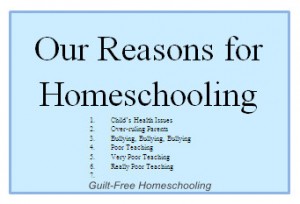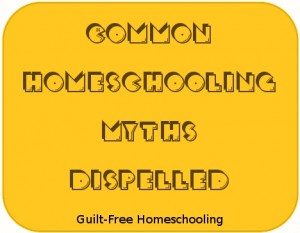[This article is in the form of an interview simply because that is how it originated.]
When did you decide to homeschool?
Our daughter was in 4th grade, and our son was in Kindergarten. We first thought about homeschooling in March, decided for sure in April, quietly finished out the school year through early June, and began homeschooling the next September. I spent that summer reading everything I could borrow on homeschooling, took notes to keep after I returned the books/magazines, and basically over-prepared myself.
What convinced you that homeschooling was right for you?
I heard Gregg Harris speak on a local talk radio show. My husband and I attended the weekend seminar he was promoting, and we got enough answers to our questions to decide that homeschooling would remove or reduce most of the problems we were having with public school.
Did you and your spouse agree on the decision to homeschool?
We made our decision together to homeschool, but my husband said he had wanted to homeschool for a couple of years, but did not want to put that burden on me! He was always supportive of our homeschooling efforts, becoming more and more outspoken for homeschooling as we went along.
Did you have to face any objections from family members or friends?
We each told our mothers with great fear and trembling, and let them tell our siblings. My mom swallowed hard and then said that she figured I could handle it. My husband’s mother said she did not see why we had not begun homeschooling a long time before! We told all of our family and friends that we were trying this “for a year, to see how that goes.” I knew from the beginning that there would be no turning back, but saying “for a year” made it less scary, even for me. My sisters secretly told my mom that my kids would “be weird.” (Sorry to disappoint you, but no, my kids are normal.)
What were some of your reasons for wanting to homeschool?
This will be a partial list — my list of reasons to homeschool gets longer every day!
1) Our daughter’s health: she suffered severe headaches that the school nurses denied existed (no fever + no vomiting = not sick). One classroom teacher said she could tell from my daughter’s face the moment a headache began, but the nurse and the principal insisted it was just “school phobia.” (Right — the same student who later earned a Bachelor of Arts degree at age 20.) With homeschooling, if our daughter was not able to do math one day, but could do reading, who would care? She could later make up any missed work without disrupting anyone’s schedule.
2) Public schools (two — we changed schools trying to work things out) were interfering in parental decisions, often superceding our parental authority. Complete disregard of our request to excuse our Kindergartner from the AIDS lesson, after the school had offered to excuse any student whose parents requested it in writing. (Just the existence of a lesson on AIDS for K-students was abhorrent enough.) My daughter had been the only student excused from the AIDS lesson for her class, and she was punished for the absence with extra work in her other subjects. We also learned later that each of our children was taken on school field trips that we were never informed of (without a signed parental consent form). We also dealt with administrators who lied to our children, stole personal property from our child, and refused to allow a sick child access to the telephone to inform us of her illness — forcing the ill child to remain in classes all day. (The child’s academic status was not a consideration: even with her absence-due-to-illness rate as high as one-third of the time, she remained at the top of her class — amazing when you consider #5 below.)
3) Lack of Christian values in public school (even from teachers we personally knew were Christians). The old adage seemed to apply: When in Rome (or the pagan school system), do as the Romans (or the other pagans) do.
4) Severe harassment from other students — I phoned the principal at home one Friday night at 10pm to report the bruising I had just discovered all over my daughter’s body. She had been repeatedly punched and kicked by her desk mate for not giving him the answers in class. The teacher stopped it once, but had merely told him, “Don’t let me catch you hitting her again,” and he made sure the teacher never caught him again.
5) Poor teaching (in the state which has claimed #1 status for years) — my daughter was in 4th grade, read poorly (guessing at words), and struggled in every subject. When she had missed 5 consecutive days of school for an illness, I spoke to the teacher about picking up her missed assignments. The teacher told me there was no homework — the class had not progressed beyond what my daughter had been present for. As it turned out, the teacher spent 10 consecutive class days trying to teach the students to multiply 3 numbers times 3 numbers, failed, gave up, and moved on. The teacher could not do the math herself, and her teacher’s aide also could not do the math — so the students never learned it either. (I had taught it to my daughter in about 2 minutes at home during her illness.) This was not an isolated case: I was personally acquainted with another teacher (special ed.) in the same school system who was required to teach an elementary math class, but freely admitted that her husband paid all the bills and kept the checkbook because she was “horrible at math.”
6) I was very skeptical of one teacher’s “lifestyle choices,” made evident by her boastful reports to her students (9-10 year-olds) of her weekend activities.
7) My son spent most of Kindergarten on the time-out chair because he already knew what the teacher was teaching the other children, and he became bored and restless. He told me a few years later that he thought he was the Principal’s favorite student, since the Principal often removed him from class and took him to the office to talk or let my son accompany him on “rounds” of the building, and they spent a great deal of time together.
8 ) Public school activities (sports, music programs, fund-raisers, etc.) often kept us and our children out late at night on school nights and left the children much too excited to go right to sleep afterwards. How were they supposed to wake up refreshed and ready for school early the next morning? (The relaxed schedule of homeschooling allows you to sleep in when necessary.)
9) The food served at public school was rarely to my daughter’s liking. (Actually, it was also a cause of her headaches.) Taking lunch from home was slightly better, but eating lunch at home while homeschooling is great! (I am happy to report that home-cooked food and careful supervision of her diet brought those nasty headaches into submission.)
10) Security at the school was nearly non-existent. Anyone could enter the building at any time, unnoticed. One morning I dropped off my daughter at the school’s front door, not realizing that school had been postponed due to extreme fog in the rural areas (weather in town was a fine drizzle, not foggy, but all classes were delayed). I was not notified to come back to get my child, and she was not allowed to enter the building before classes actually began for the day, even though staff members were present. She had to stay outside on the playground — unsupervised and in the rain — until school started an hour later (or was it 2 hours?)
11) The (sexual) peer pressure was unbelievable — and I’m talking about 8 and 9 year olds!!!
12) Discipline at the school was non-existent. There was no alternative for “good” students except to put up with the disruptions and harassment from the “bad” students. If a teacher’s verbal admonition had no effect on a disruptive student, there was no recourse.
Do you feel your children missed some things by not attending public school?
Once we decided to begin homeschooling, I was often asked if I felt my children were missing anything by not being in public school. My answer was always a sly smile and an emphatic “YES! They are missing the playground vocabulary, the sexual harassment in the lunchroom on hotdog day, and the physical abuse from little extortionist in the next desk who is not interested in learning anything. And I wouldn’t have it any other way!”
Do you have any regrets about your decision to homeschool?
Only one — that we did not begin homeschooling sooner.
[The follow-up to this story may be found at Start Homeschooling for One Reason, but Continue for Another.]




 Guilt-Free Homeschooling is the creation of Carolyn Morrison and her daughter, Jennifer Leonhard. After serious disappointments with public school, Carolyn spent the next 11 years homeschooling her two children, from elementary to high school graduation and college admission. Refusing to force new homeschooling families to re-invent the wheel, Carolyn and Jennifer now share their encouragement, support, tips, and tricks, filling their blog with "all the answers we were looking for as a new-to-homeschooling family" and making this website a valuable resource for parents, not just a daily journal. Guilt-Free Homeschooling -- Equipping Parents for Homeschooling Success!
Guilt-Free Homeschooling is the creation of Carolyn Morrison and her daughter, Jennifer Leonhard. After serious disappointments with public school, Carolyn spent the next 11 years homeschooling her two children, from elementary to high school graduation and college admission. Refusing to force new homeschooling families to re-invent the wheel, Carolyn and Jennifer now share their encouragement, support, tips, and tricks, filling their blog with "all the answers we were looking for as a new-to-homeschooling family" and making this website a valuable resource for parents, not just a daily journal. Guilt-Free Homeschooling -- Equipping Parents for Homeschooling Success!

Recent Comments